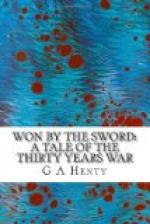His army consisted of between fourteen and fifteen thousand men, that of Enghien of seventeen thousand. After examining the position a council of war was held. Turenne was strongly against attacking the enemy in a position of such strength, but Enghien as usual overruled his opinion. Turenne then urged that the cavalry on the wings should not charge up the hills and attack the positions held there until the enemy’s centre had been defeated, and his advice in this respect was taken. The generals then separated and rode to their respective commands. De Gramont commanded the right wing, consisting of all the French cavalry, and having as a second line a reserve consisting of four battalions of infantry and six squadrons of horse commanded by Chevalier de Chabot. Turenne commanded the left, which consisted of his own army, with twelve squadrons of Weimar’s cavalry, with the Hessian army — six battalions and six squadrons — as a second line. The centre, consisting of ten battalions and five squadrons of horse, was commanded by Count de Marsin. Enghien took no special command, preferring to remain free to go where his presence was most needed.
CHAPTER XVIII: NORDLINGEN
It was five o’clock in the afternoon when all the arrangements for the attack were completed. But as on the 3rd of August the evening is long, it was judged that there would be sufficient daylight to carry out the battle. The French began with a cannonade against the village, and this was replied to by the guns on the two hills. Not only did the position of the latter give them great superiority, but much time was lost by the French in being obliged to move forward their guns as the army advanced, a slow and tedious process in days when cannon were very heavy and cumbrous. Seeing that they were losing time and suffering more loss than they inflicted, Enghien gave the order to the infantry of the centre to advance.
They went forward with great speed and eagerness, for they were burning to retrieve their cowardly conduct at Marienthal. They carried the intrenchments Merci had thrown up at the mouth of the pass, and, heedless of the firing of the guns, rushed at the village. Here, however, they were received by so heavy a fire of musketry from the infantry posted there, who had loopholed all the walls and houses, that they came to a stop, and, being shot down in great numbers, turned and fled. The Count de Marsin was himself dangerously wounded. The Duc d’Enghien sent the Marquis de la Moussaie forward with a reinforcement of several regiments, but these, too, fell back before the Imperialists’ fire. The Duc d’Enghien then rallied the infantry, added to them all those not yet engaged, and himself led them to the charge. Merci on his part brought forward his main body to the village.




